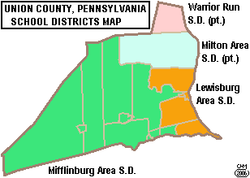
Clinton County is a county in the Commonwealth of Pennsylvania. As of the 2020 census, the population was 37,450. Its county seat is Lock Haven. The county was created on June 21, 1839, from parts of Centre and Lycoming Counties. Its name is in honor of the sixth Governor of New York, DeWitt Clinton. Some alternate sources suggest the namesake is Henry Clinton. Clinton County comprises the Lock Haven, PA Micropolitan Statistical Area, which is also included in the Williamsport-Lock Haven, PA Combined Statistical Area. The county is part of the Central Pennsylvania region of the state.
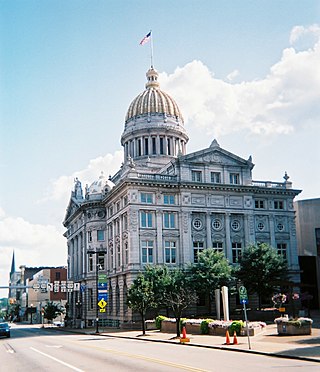
Westmoreland County is a county in the Commonwealth of Pennsylvania, United States, located in the Pittsburgh Metropolitan Statistical Area. As of the 2020 census, the population was 354,663. The county seat is Greensburg and the most populous community is Hempfield Township. It is named after Westmorland, a historic county of England. The county is part of the Southwest Pennsylvania region of the state.

Warren County is a county in the Commonwealth of Pennsylvania. As of the 2020 census, the population was 38,587. Its county seat is Warren. The county was established in 1800 from parts of Allegheny and Lycoming counties; attached to Crawford County until 1805 and then to Venango County until Warren was formally established in 1819.

Snyder County is a county in the Commonwealth of Pennsylvania. As of the 2020 census, the population was 39,736. The county seat is Middleburg. Snyder County was formed in 1855 from parts of Union County. The county is part of the Central Pennsylvania region of the state.
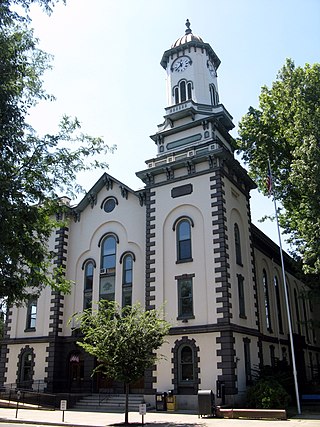
Northumberland County is a county in the Commonwealth of Pennsylvania. As of the 2020 census, the population was 91,647. Its county seat is Sunbury. The county is part of the Central Pennsylvania region of the state.

Montour County is a county in the Commonwealth of Pennsylvania. As of the 2020 census, the population was 18,136. Its county seat is Danville. The county is named for Andrew Montour, a prominent Métis interpreter who served with George Washington during the French and Indian War. It encompasses 132 sq mi, making it the smallest county by land area in the state. The county is part of the Central Pennsylvania region of the state.
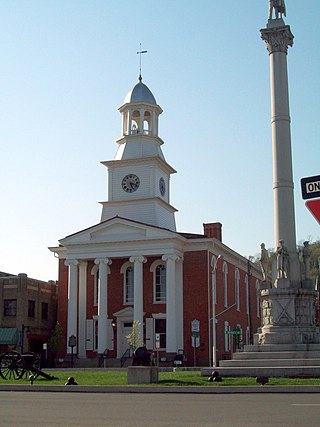
Mifflin County is a county in the Commonwealth of Pennsylvania. As of the 2020 census, the population was 46,143. Its county seat is Lewistown. The county was created on September 19, 1789, from parts of Cumberland County and Northumberland County. It was named for Thomas Mifflin, the first Governor of Pennsylvania. Mifflin County comprises the Lewistown, PA Micropolitan Statistical Area. The county is part of the Central Pennsylvania region of the state.
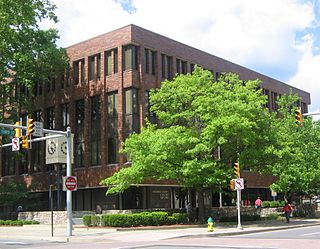
Lycoming County is a county in the Commonwealth of Pennsylvania. As of the 2020 census, the population was 114,188. Its county seat is Williamsport. The county is part of the Central Pennsylvania region of the state.

Jefferson County is a county in the Commonwealth of Pennsylvania. As of the 2020 census, the population was 44,492. Its county seat is Brookville. The county was established on March 26, 1804, from part of Lycoming County and later organized in 1830. It is named for President Thomas Jefferson. It is home to Punxsutawney Phil, the most famous groundhog that predicts when spring will come every February 2 on Groundhog Day. The county is part of the North Central Pennsylvania region of the state.

Franklin County is a county in the Commonwealth of Pennsylvania. As of the 2020 census, the population was 155,932. Its county seat is Chambersburg.
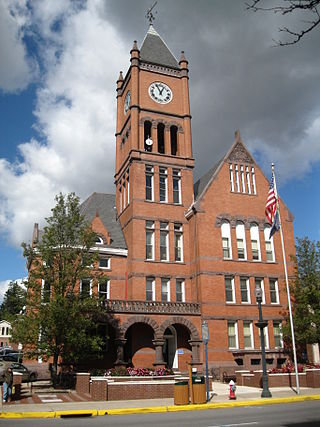
Columbia County is a county in the Commonwealth of Pennsylvania. It is located in Northeastern Pennsylvania. As of the 2020 census, the population was 64,727. Its county seat is Bloomsburg. The county was created on March 22, 1813, from part of Northumberland County. It was named Columbia, alluding to the United States and Christopher Columbus. The county is part of the Central Pennsylvania region of the state.

Centre County is a county in the Commonwealth of Pennsylvania, United States. As of the 2020 census, the population was 158,172. Its county seat is Bellefonte. Centre County comprises the State College, PA Metropolitan Statistical Area. The county is part of the Central Pennsylvania region of the state.
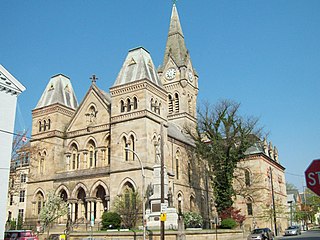
Blair County is a county in the Commonwealth of Pennsylvania. As of the 2020 census, the population was 122,822. Its county seat is Hollidaysburg, and its largest city is Altoona. The county was created on February 26, 1846, from parts of Huntingdon and Bedford counties. The county is part of the Southwest Pennsylvania region of the state.

Hartleton is a borough in Union County, Pennsylvania, United States. The population was 247 at the 2020 census. The borough, as well as the adjoining township of Hartley, are both named for Colonel Thomas Hartley, American politician and Revolutionary War leader, and local landowner. An alternative name was Hartleyton and later shortened to the present name. The original name was Kester's, and named for Peter Kester who was the first tenant of Hartley. Kester's was at the intersection of "great Reuben Haines road" from Northumberland through Dry Valley, New Berlin and the Penns Valley Narrows, and the first public road laid out in the area by Northumberland County court from Northumberland through Derrstown (Lewisburg) and Mifflinburg. Hartley never lived there, as his home was in York, PA. Hartley acquired the land in 1784 from original purchaser Colonel Philip Cole after Cole left the area because of the "Big Runaway" of 1778. Cole purchased the land in 1773, and was living there in 1775. Hartley laid out a town as early as 1798, and the first lot sold in 1799.

Mifflinburg is a borough in Union County, located in the Susquehanna River Valley of central Pennsylvania, United States. In 1792, Mifflinburg was settled by Elias and Catharina Youngman and 8 other families, many of them German, and the village of Mifflinsburgh was formed. It was named for Thomas Mifflin, who was governor of Pennsylvania and first governor under the PA Constitution of 1790, and a signer of The Declaration of Independence. Youngmanstown was another name based upon common nemonclature only, but not officially. In 1827, Mifflinburg, a.k.a. Youngmanstown, and another town adjacent to the east named Greenville, a.k.a. Rhodestown,, were combined and incorporated into a borough. The first horse drawn buggy and carriage manufacturing company was established in 1845; and Mifflinburg would become the Buggy and carriage manufacturing capital of the United States in the late 19th century. There are many Victorian homes and downtown business buildings. Mifflinburg is known for The Mifflinburg Buggy Museum, Buggy Day, annual authentic Christkindle Market the second weekend of December, and German Oktoberfest.

New Berlin is a borough in Union County, Pennsylvania, United States. The population was 802 at the 2020 census.

Cumberland County is a county in the Commonwealth of Pennsylvania. As of the 2020 census, the population was 259,469. Its county seat is Carlisle. The county is part of the South Central Pennsylvania region of the state.

Pennsylvania Route 45 is an 86-mile-long (138 km) state highway that is located in central Pennsylvania, United States. The western terminus of the route is situated at PA 453 in Morris Township near the community of Water Street. The eastern terminus is located at PA 642 west of the small town of Mooresburg.
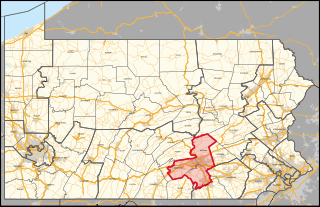
Pennsylvania's 10th congressional district is located in the south-central region of the state. It encompasses all of Dauphin County as well as parts of Cumberland County and York County. The district includes the cities of Harrisburg and York. Prior to 2019, the district was located in the northeastern part of the state. The Supreme Court of Pennsylvania redrew the district in 2018 after ruling the previous map unconstitutional because of gerrymandering. The court added State College to the old district's boundaries while removing some Democratic-leaning areas and redesignated it the twelfth district; an area encompassing Harrisburg and York was numbered as the "10th". The new tenth district is represented by Republican Scott Perry, who previously represented the old fourth district.
Central Susquehanna Intermediate Unit #16 (CSIU), located in the Milton Industrial Park, Milton, Pennsylvania, was created by the Pennsylvania General Assembly in 1971 as one of 29 Intermediate Units in the commonwealth. Intermediate units serve a given geographic area's educational needs and function as a step of organization above that of a public school district, but below that of the Pennsylvania Department of Education. The state's goal is for IU's to meet student and community needs in a cost-effective manner by providing services best offered on a regional basis such as special education, technical education, services to public and nonpublic schools. IN 2016-17 the CSIU16 budget is $76.7 million for programs and services and $1,073,846 General operating budget.




